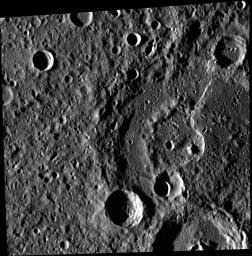Today's image features a sinuous lobate scarp that snakes across the floor of Sinan crater. Sinan is an older, degraded impact crater, 134 km in diameter. Sinan's rim and peak ring mountains have been worn down by impacts, and the basin has been profoundly modified by several large, younger impacts. And small hollows dot parts of the northern rim, lobate scarp, peak ring, and floor.
Joseph Sinan was a Turkish architect who lived from about 1490 to 1588 CE. He was a chief architect to several Ottoman sultans. He and his apprentices designed a number of famous mosques and other buildings.
This image was acquired as part of MDIS's high-resolution stereo imaging campaign. Images from the stereo imaging campaign are used in combination with the surface morphology base map or the albedo base map to create high-resolution stereo views of Mercury's surface, with an average resolution of 200 meters/pixel. Viewing the surface under the same Sun illumination conditions but from two or more viewing angles enables information about the small-scale topography of Mercury's surface to be obtained.
Date acquired: October 29, 2011
Image Mission Elapsed Time (MET): 228371453
Image ID: 945803
Instrument: Wide Angle Camera (WAC) of the Mercury Dual Imaging System (MDIS)
WAC filter: 7 (748 nanometers)
Center Latitude: 15.65°
Center Longitude: 328.3° E
Resolution: 168 meters/pixel
Scale: The scene is about 175 km (109 mi.) across
Incidence Angle: 82.5°
Emission Angle: 15.0°
Phase Angle: 69.4°
North is up in this image.
The MESSENGER spacecraft is the first ever to orbit the planet Mercury, and the spacecraft's seven scientific instruments and radio science investigation are unraveling the history and evolution of the Solar System's innermost planet. During the first two years of orbital operations, MESSENGER acquired over 150,000 images and extensive other data sets. MESSENGER is capable of continuing orbital operations until early 2015.
For information regarding the use of images, see the MESSENGER image use policy.

 Planetary Data System
Planetary Data System












